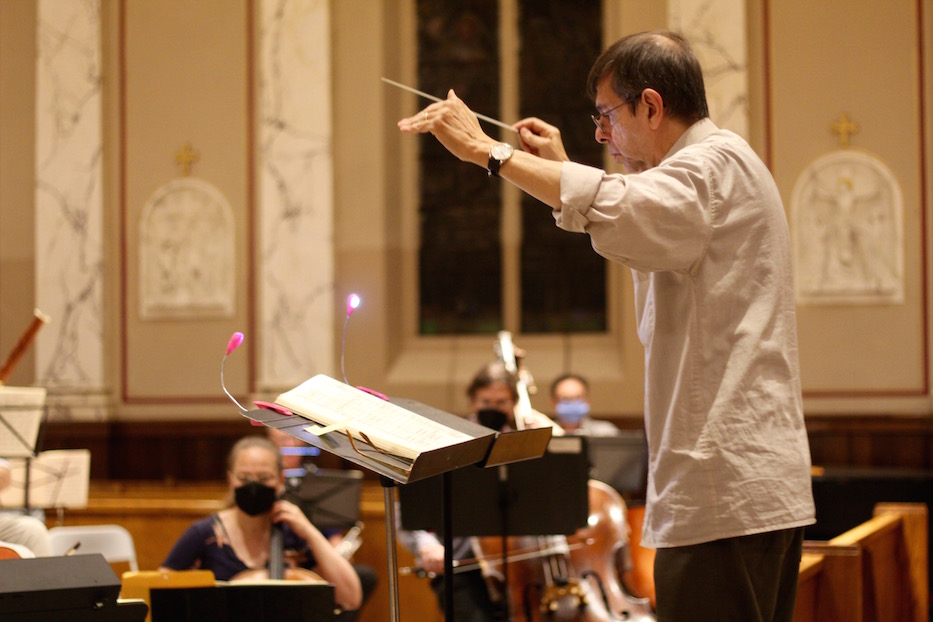
East Rock | Music | Arts & Culture | COVID-19 | New Haven Chorale
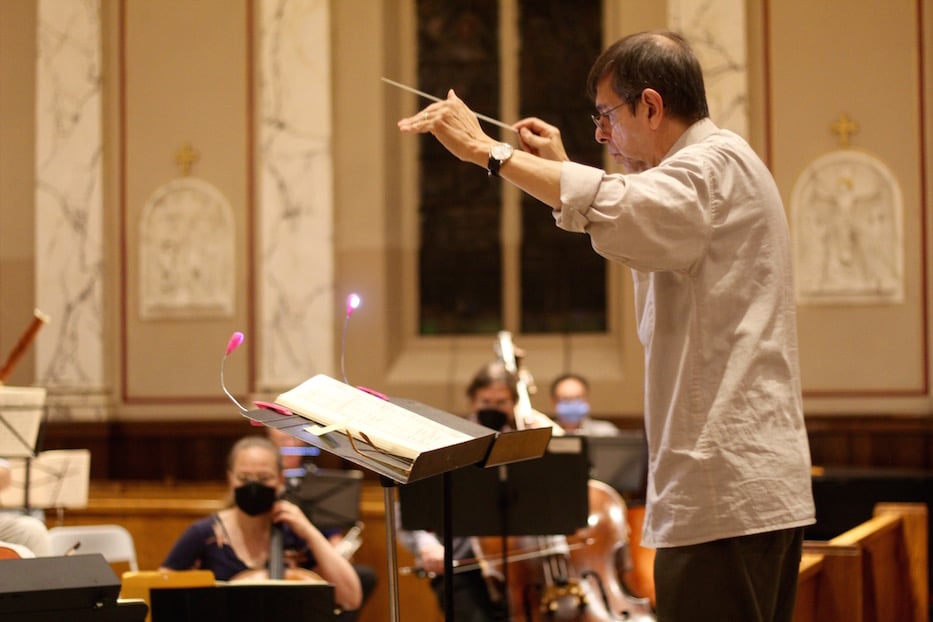
Music Director Edward Bolkovac, who has led the chorale since 2003. Lucy Gellman Photos.
The words filled St. Joseph’s Church, rising toward the vaulted ceiling. Va-anachnu korim, u'mishtachavim, u'modim, sang Rafael Frieder, his eyes fixed on the front of the church. Lifnei melech, malchei ham'lachim—they floated over images of the Virgin Mary and discarded pamphlets for Palm Sunday—Hakadosh baruch Hu. He paused, the air around him trembling.
Music Director Edward Bolkovac raised his baton just an inch higher, leaned forward, and extended to his full wingspan. Voices swelled as brass and timpani joined in, easing into every corner of the church. They spilled out onto Edwards Street, seeping into the warm, velvet night.
That sound came from the New Haven Chorale, which this Sunday will perform Ernest Bloch’s “Sacred Service” (Avodath Hakodesh) as part of its concert Voices Of A New Spring. After a gradual, Covid-cautious return to singing last fall, pandemic-proofed December concert, and masked, socially distanced rehearsals this spring, the performance still feels like a miracle.
It is the first time since 2007 that the chorale has performed Bloch’s sweeping work, which includes 75 singers, one retired New York cantor, a reader, a 32-musician orchestra, and a total leap of faith.
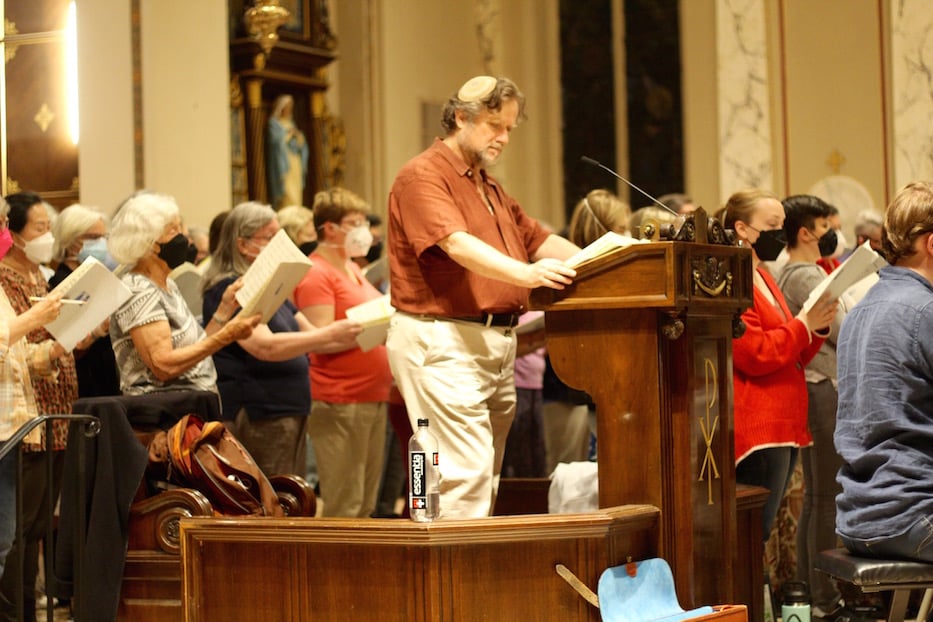
Rafael Frieder, who until 2020 was the cantor at Temple Israel of Great Neck, New York.
"It's about being a part of a community," said Bolkovac, who has been leading the chorale since 2003. "It's got a spiritual aspect. It's got a musical aspect. Singing also has a real physical aspect, and so I think it reaches people on multiple levels. I think what Covid has taught me is that the spiritual and communal element may be, in the final analysis, more important than the actual project. It feels more like a ministry."
The concert takes place June 12 at St. Joseph’s Church at 129 Edwards St. in New Haven at 3 p.m. It also includes work from Cantor Joseph Ness and Noah Stein, a New Havener who is now studying composition at Yale University. Tickets and more information are available here.
Written over three years and published in 1933, the Sacred Service comprises five parts, each pulled directly from Jewish liturgy and performed in Ashkenazic Hebrew. As the work unfolds, it welcomes a listener into a service with prayer—just as a rabbi and cantor would during a Saturday morning Shabbat service—then moves through a melodic arc that transcends any one prayer, any one belief, any one physical house of worship.
It operates in both call and response, spoken sections (Ness, a cantor at Beth El Temple in West Hartford, will be reading Sunday), and sweeping cantorial solos, bringing the audience into a sanctified space one prayer at a time. In just short of an hour, it presents a centuries-old ritual in a completely new way, as if Bloch’s charge was to remind people why they pray in the first place.
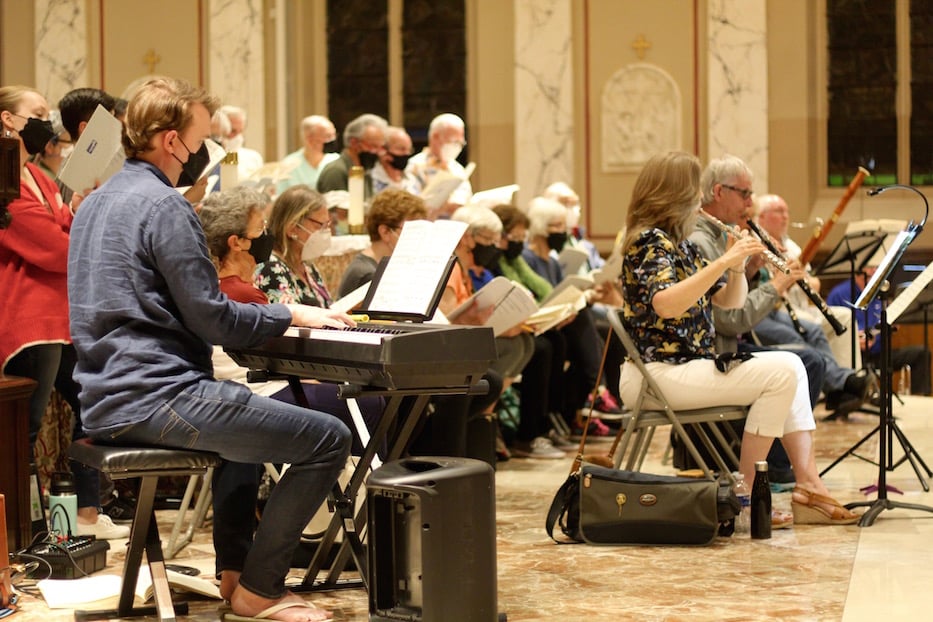
Some parts of it still feel churchy in the way that professional choirs (rather than lay-led congregations) feel churchy; the best parts of it channel what makes Jewish ritual tonally and spiritually different from its Abrahamic counterparts. For instance there is a section dedicated to the Mourner’s Kaddish, which holds space for both memory and for grief.
Originally, Bloch worked on the piece as a commission for Temple Emanu-El, a reform congregation in San Francisco. When he finished it, it was heralded as singularly his, and also very much as history’s. “One is deeply aware of the poignancy, the tenderness and the nobility of the music,” reads a New York Times review of the piece from 1936, when it closed out a choral festival in California.
It was that same sensibility that spoke to Bolkovac 15 years ago, and again this winter as he considered the work. In 2007, the music director found that “I had a great affinity” for the piece, so strong it was as if he had heard and performed it before. His interest in the work never faded. Over a decade and one pandemic later, the Bloch grabbed his attention anew, announcing itself as a piece that fit into a three-year story of the chorale’s survival.
"I didn't want to do another mass setting," Bolkovac said. "I didn't want to do another thing that we've done in the more recent past. And somehow, I took out this piece, and as I kept ruminating, all the other pieces that I had been looking at kept coming and going and the Bloch just kept staying on my desk. I just thought to myself, 'I wonder if we can pull this off.'"
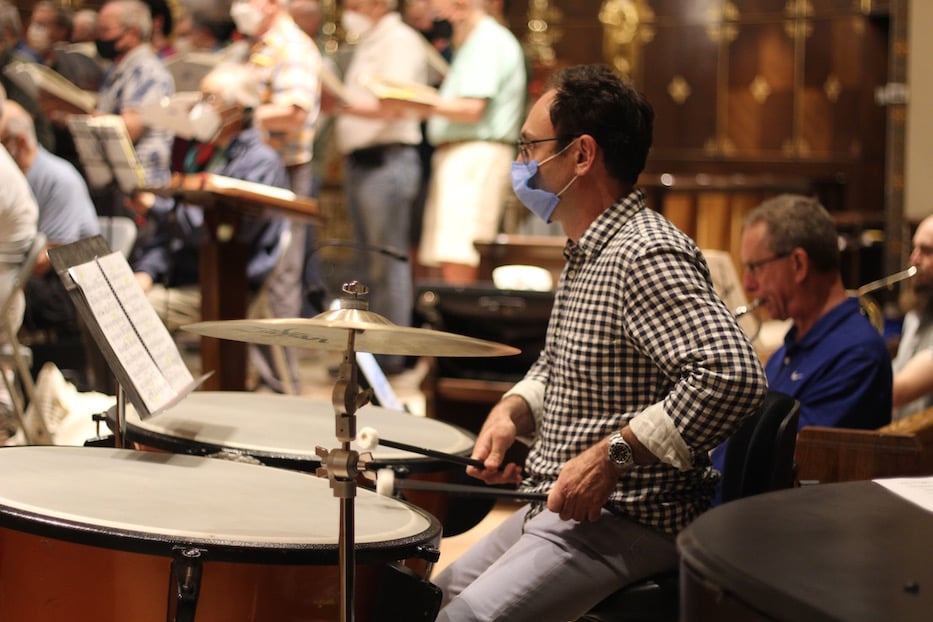
Michael Singer on the timpani. He is part of a 32-member orchestra joining roughly 75 singers Sunday.
Months later, he very much has—as have over five dozen singers who have stuck with it. After rehearsing masked for months, the chorale gathered this week in the heart of St. Joseph’s church, whose yellow brick facade rises from Edwards Street in New Haven’s East Rock neighborhood.
Singers buzzed around, still masked as they ran through warmups, checked in with friends and set down bags, sweaters, water bottles and books of sheet music in the pews. Around them, musicians seemed to multiply, until suddenly there were horns, percussion, strings, timpani, and a single, glowing harp assembled in front of the chorale. They represented a fraction of those who will be there Sunday. It was time.
Bolkovac directed the chorale to the fifth movement, which includes the Aleinu. In Judaism, the Aleinu comes not just at the end of Shabbat services, but all daily prayer services; it is in effect a summary of the service itself, and also arguably of the act of believing.
As singers stood at attention—backs straight, eyes focused on Bolkovac, masks pulled neatly over their noses and mouths—strings unfurled, lifting gently as horns crept in beneath them. Oboe and bassoon slipped right in, their shrill, reeded voices making their way slowly toward the ceiling. Va'anachnu korim, u'mishtachavim, u'modim, Frieder came in. His whole carriage lifted with the words, breath filling his chest. Timpani rolled in like a fast, bright breeze. In harmony, the chorale called out with the same words, then listened to see what he would do next.
Bolkovac held his hands up gently and stopped the chorale two minutes in. He scanned the music, sang a measure back to Frieder, and took a beat. Then he lifted his hands, and the chorale began again.
The piece—written before the Second World War, before fascism sought to eliminate an entire people from the face of the earth, before the violent and contested birth of Israel—felt intimately right for the moment. The chorale is three years into a pandemic that has killed over six million people worldwide, and left many others with long Covid-19. Depression and anxiety are on the rise; global grief is a constant. This year, the also work falls amidst a documented spike in anti-Semitism in the U.S. and abroad.
In the middle of it all, the Sacred Service feels cosmic and expansive, like the best parts of praying itself. Bolkovac looked to his favorite part, a spoken meditation on the Mourner’s Kaddish, for how it is able to hold life and death, joy and pain, side by side with each other.
"These are old, old Hebrew and Jewish texts," he said. "The surviving mentality, and then having the will not just to survive but to thrive, is instilled in this piece. It's a statement about never giving up, always being resilient, always looking for the positive. What can we learn? How can we not get bogged down? To me, it's a real powerful statement about survival and triumph through difficulties.”
Back in the church, the night was young. He directed the chorale to a measure, and started again.
How They Kept Singing
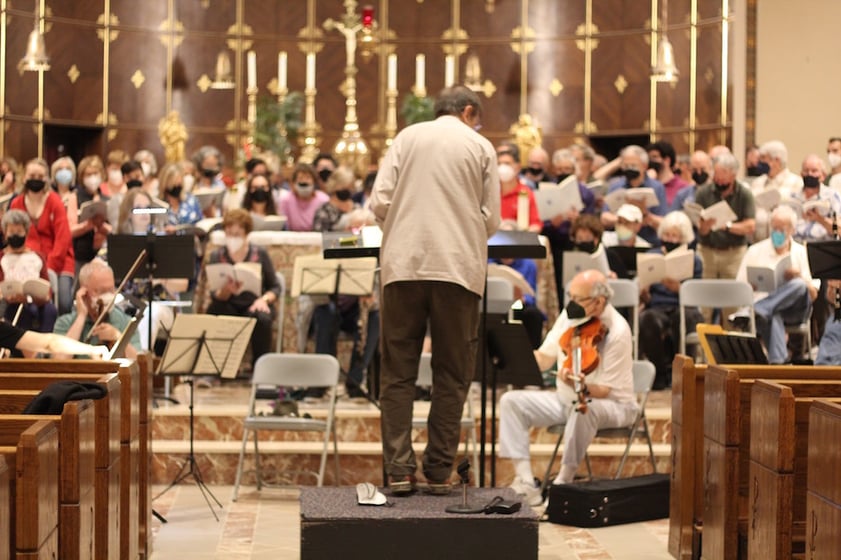
Music Director Edward Bolkovac at a rehearsal Tuesday night. Lucy Gellman Photos.
The journey to the performance is a story in itself.
In March 2020, the chorale was on the lip of performing Hector Berlioz' "Te Deum" with the Hartford Chorale, the Hartt School of Music, and a children’s choir when the world shut down. The concert, which featured some 400 singers, would have commemorated the Chorale’s 70th birthday and the Hartt School’s centenary. It was also a swan song for Bolkovac, who had decided to retire from the Hartt School prior to 2020.
Instead, singers went into lockdown as Covid-19 spread across the U.S. The concert became a casualty of the pandemic. In a phone call Wednesday, Executive Director Alice Hummel praised support from CT Humanities and the Connecticut Office of the Arts, without which she said the chorale might not have survived.
From March 2020 through the summer of 2021, the Chorale was completely virtual, except for two outdoor gatherings in Milford in the summer of 2021. Focused on "how to keep a community together," Bolkovac offered virtual programming, with Monday night rehearsals and Thursday night music theory classes. Last spring, he stitched together virtual performances with the help of Peter Robinson, who assisted with video and audio production.
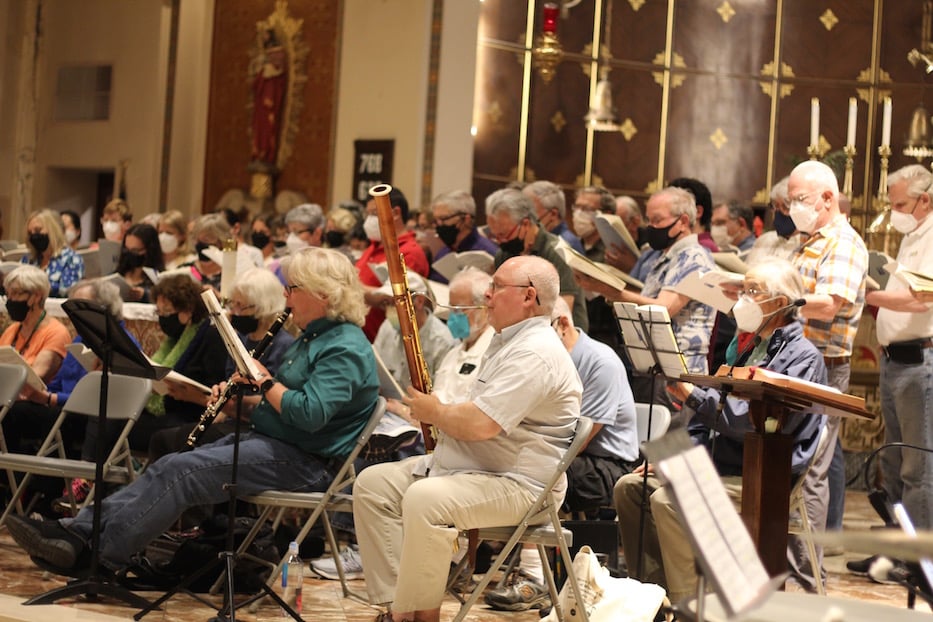
Then last September, members began to rehearse outdoors, practicing social distancing in the parking lot of the Unitarian Society of New Haven. At the beginning of the fall, the group had about 110 singers, including 25 new members who had auditioned in August. Sunday's performance will feature closer to 75.
When the weather became too cold to stay outside, choral members headed inside the building, fanning out between rows. After consulting with several practicing physicians who are also members, Chorale leadership built a rehearsal format that included masks, social distancing, testing, and a record of full vaccination with a booster shot. For months, singers rehearsed masked and 10 feet apart.
"Singing with a mask on is hard, it's difficult," Board President Linda Waldman said. "It's very difficult to hear other people in your section when they're as far away from you as they are. But it's still singing together."
Even that had its challenges. Because of size concerns, half the group came in person, and half joined remotely. Then in early 2022, members were able to rehearse together, masked and six feet apart. Now, they rehearse in every other pew, and still mask up. Last December, the group was able to perform a holiday concert with masks and social distancing. After spreading out to sing, the chorale took up half the church.
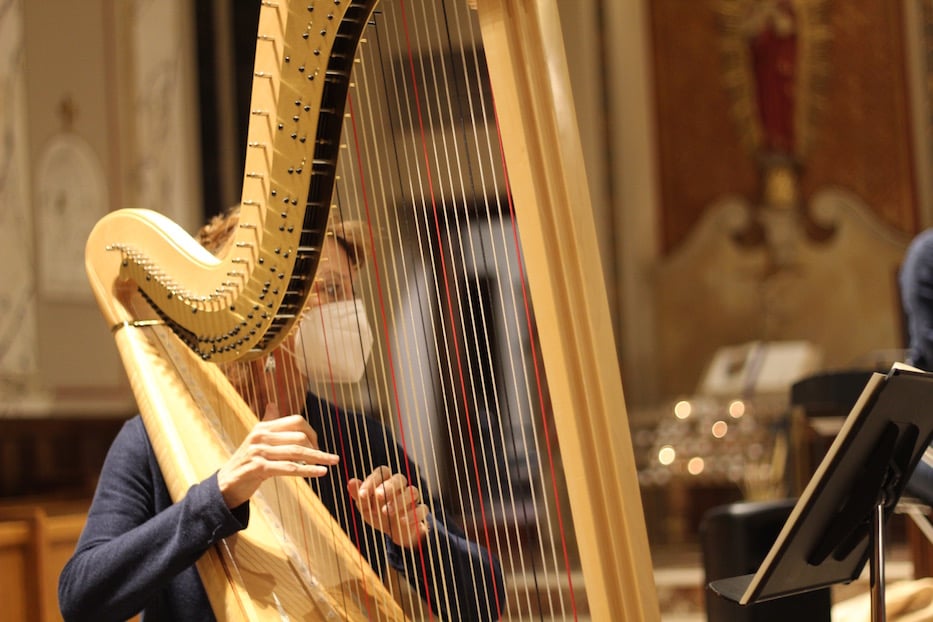
Susan Knapp Thomas on harp.
That approach has worked: Waldman said that no reported Covid exposures or infections have come from rehearsals or performances. It also represents how the group is constantly adapting. The Chorale used to do two fall concerts, a concert in February, and a final concert in May. But as members returned to singing in person—particularly as Covid-19 required them to remain masked—"that felt absolutely crazy," Bolkovac said. Instead, he and chorale members laid the groundwork for a single, more elaborate spring concert in May or June.
The Bloch, so far, has not gotten old. While Bolkovac is not Jewish himself—he grew up Catholic and played music in church “before my feet could reach the pedals,” but no longer considers himself a practicing Christian—he finds the work extremely moving. This year, it also reflects the sheer weight of all that chorale members have gone through to get to this spring.
"You're trying to make people have hope. You're trying to encourage people to not worry. You're trying to get them to think about music and spiritual concepts that are all tied in with their emotional life,” he said. “So Covid taught me that it's all about community and spirituality and all of these other things."
And, he added, they made it. In the final week of rehearsals, singers and musicians stood shoulder to shoulder in St. Joseph’s, a setup that has required frequent testing, all manner of masks, and mailing tests out to wind and horn players. As Covid-19 levels remain high in the region, “I’m just excited that we’re doing a program” at all, he said.
"I think that it won't be a perfect performance by any means—not that any performance is—but I think it's more like a validation of the community to say: Despite all the rough edges and everything that we've had to go through to get this piece to this point, it's almost a celebration of survival.”
Voices of a New Spring takes place this Sunday, June 12, at St. Joseph’s Church at 129 Edwards St. in New Haven at 3 p.m. Tickets and more information are available here.

